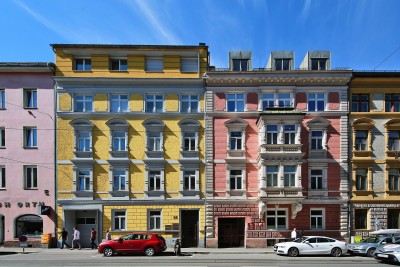Real Estate Prices in Austria Increased: Housing Increasingly Less Affordable
The cost of residential real estate in Austria has risen dramatically in recent years, significantly affecting affordability for many households. According to a recent analysis conducted by UniCredit Bank Austria, residential property prices in the euro area have risen faster than incomes. Austria has been particularly affected by this development, where property prices have actually fallen by almost 40 percent compared with incomes.
 The purchase of a newly constructed residential property with 100 square meters in 2022 required an average of 6.5 net annual salaries of an Austrian household. / Picture: © Wikimedia Commons / Simon Legner (User:simon04), CC BY-SA 4.0
The purchase of a newly constructed residential property with 100 square meters in 2022 required an average of 6.5 net annual salaries of an Austrian household. / Picture: © Wikimedia Commons / Simon Legner (User:simon04), CC BY-SA 4.0
The study shows that average net earnings in terms of real estate prices have fallen by around 13 percent since 2009, but in Austria, a drastic drop in value of almost 40 percent was recorded. The increase in real estate prices in the euro area in 2022 was 45 percent above the level of 2009, which corresponds to an average annual increase of almost three percent since the financial crisis.
The increase is particularly notable in Austria, where residential property prices have more than doubled. A newly built property of 50 square meters required an average of 100,000 euros in 2009, while the price has risen to an average of 230,000 euros in 2022.
Experts emphasize that the main reason for the limited affordability is the increased real estate prices, not the interest rates. The analysis shows that the monthly borrowing costs for real estate financing in Austria have risen sharply, mainly due to real estate price increases. Higher prices have led to the monthly cost of a real estate loan as a share of average net earnings exceeding 19 percent in 2022, up from about 12 percent in 2009.
Despite these challenges, housing in Austria is still considered relatively cheap by European standards. An expert at UniCredit Bank Austria explains that the purchase of a newly constructed residential property with 100 square meters in 2022 required an average of 6.5 net annual salaries of an Austrian household. While this is higher than in some other European countries, it is still lower than in countries such as France, Spain and Germany.
OeNB chief calls for increased advice on real estate loans
Rising interest rate burdens for real estate borrowers, especially those with variable-rate loans, have triggered a debate on appropriate safeguards. The governor of the Oesterreichische National Bank (OeNB), Robert Holzmann, advocated more comprehensive and mandatory advice before borrowing, ORF reported. Holzmann stressed that taking out a real estate loan is one of the biggest financial decisions in life and that more comprehensive advice is necessary to adequately consider the risks and scenarios.
Holzmann emphasizes, as reported by ORF, that the implications of such a decision cannot be adequately weighed in a short one-hour consultation. Rather, several scenarios had to be considered, which is why a more detailed consultation of several hours was necessary. In an interview with the newspaper "Die Presse", Holzmann had already previously supported the call for more intensive credit advice and mandatory training before taking out a loan.
To minimize the risk of variable-rate housing loans, Holzmann suggests thinking about granting real estate loans with a fixed interest rate for the first five or ten years. Some countries already do this. However, as reported by ORF, Holzmann stresses that these changes are political decisions and that possibly too much has been imposed on individuals in Austria. He notes that floating rates are a form of speculation in which the outcome can be either positive or negative.
Economic Research Institute with a different perspective
However, the head of the Economic Research Institute (WIFO), Gabriel Felbermayr, as reported by ORF, brings a different perspective. He explains that the high proportion of variable-rate loans in Austria is not primarily due to a lack of banking advice and financial education, but rather to framework conditions and regulations.
He states, as reported by ORF, that in Austria it is comparatively easy to get out of a fixed-rate loan, which is in contrast to Germany. For banks, he says, it is less profitable to offer fixed-rate loans because of customer preferences and expectations. These are more expensive for customers, as the banks assume that customers will stay on the loan when interest rates are high and switch to variable rates when interest rates are lower.



